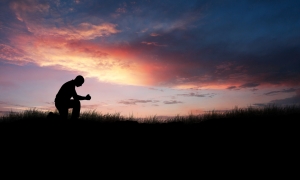COMMENTARY | Josh Laxton
Last spring, my wife and I bought a used minivan. Honestly, I’m not a big fan of minivans, nor am I a fan of buying a much-older car. (I didn’t learn auto repair in seminary.) However, I am a big fan of making my wife happy.
Not long after purchasing the van, I was driving with our three small children when, suddenly, after a few mildly intense sputtering episodes, the van died. There I was, with a broken down car, stranded in the middle of the road, with no shoulder to move the vehicle to safety. As I tried to decide what to do, my 4-year-old daughter had her own breakdown. Her piercing cries of, “Daddy, Daddy!” were accompanied by heavy sobbing and huge tears. Ellie broke down because of our van’s condition.
 For many of us, our churches are like my minivan. Depending on the source, 80-90% of churches are in a state of plateau or decline. They were running fine, but something happened along the way, and now the church is not functioning and operating the way Jesus intended—as a God-glorifying, gospel-centered, mission-oriented, disciple-making, church-planting vehicle. Sure, the flashers, radio, horn, and air still work (worship and programs are still going, committees are still meeting). But there is a breakdown in the primary reason for the church’s existence—it’s literally not moving, not going anywhere.
For many of us, our churches are like my minivan. Depending on the source, 80-90% of churches are in a state of plateau or decline. They were running fine, but something happened along the way, and now the church is not functioning and operating the way Jesus intended—as a God-glorifying, gospel-centered, mission-oriented, disciple-making, church-planting vehicle. Sure, the flashers, radio, horn, and air still work (worship and programs are still going, committees are still meeting). But there is a breakdown in the primary reason for the church’s existence—it’s literally not moving, not going anywhere.
The question is not whether our churches need a breakout to the next level of growth or ministry. Rather, it’s how we as leaders can get them there. To do so, like Ellie, we need to have a breakdown over the condition of the church.
Nehemiah is an excellent example of a leader who identified the need for breakout, and in doing so, had a breakdown. Although he had never been to Jerusalem, he had great affection and concern for his homeland; therefore, when his brothers came to visit, he asked how his countrymen were faring. The news he received was bad; the people and the city were broken. The Bible says that upon hearing this, Nehemiah “wept and mourned” for days. In addition, he “continued fasting and praying before the God of heaven.”
What led to Nehemiah’s breakdown? Two key truths stand out:
First, he knew the truth about God and what God had called His people to be and do (Genesis 12:3; Exodus 19:4-6). When Nehemiah learned that the wall was in ruins and the people lived in great trouble and shame, he recognized that they were not where they were supposed to be. That has implications for our ministry today: Do we know with certainty the honest, transparent conditions of our church in relation to God’s intended reality, rather than our own presuppositions, preferences, or traditions?
Second, not only did Nehemiah know the truth about God’s intended reality for his people, he also knew the heart of God. In other words, he not only knew about God and His plan, but he also knew God. Thus, when he heard about the condition of the city and the people, he went immediately to the Father, weeping, morning, fasting, and praying.
He was broken over their condition because God was broken over their condition. As a result, the Bible tells us, Nehemiah “continued” going to the Father.
Nehemiah led in a way that reflected the heart of God and how He viewed the condition of the people. As leaders, are we leading in a way that reflects the heart of God towards the people in our churches?
Breakout in Jerusalem didn’t happen until Nehemiah broke down. The good news is that God still works in our brokenness to lead his people to breakout.
Josh Laxton is lead pastor of Western Oaks Baptist Church in Springfield. His second column on Nehemiah will appear in the August 18 issue of the Illinois Baptist, online at http://ibonline.IBSA.org.







 What’s a little more unusual is that my wife, Beth, is traveling with me. Our youngest son Ethan is leading the worship team at our home church in Springfield, and Beth would like to be there too. But by evening we will be at the church where our middle son Noah is youth pastor, and so she has decided to come along. So it’s already an especially good Sunday.
What’s a little more unusual is that my wife, Beth, is traveling with me. Our youngest son Ethan is leading the worship team at our home church in Springfield, and Beth would like to be there too. But by evening we will be at the church where our middle son Noah is youth pastor, and so she has decided to come along. So it’s already an especially good Sunday.


